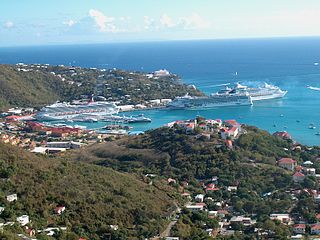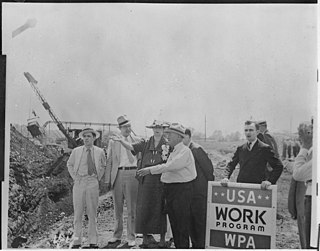Related Research Articles

The economy of the United States Virgin Islands is primarily dependent upon tourism, trade, and other services, accounting for nearly 60% of the Virgin Island's GDP and about half of total civilian employment. Close to two million tourists per year visit the islands. The government is the single largest employer. The agriculture sector is small, with most food being imported. The manufacturing sector consists of rum distilling, electronics, pharmaceuticals, and watch assembly. Rum production is significant. Shipments during a six-month period of fiscal year 2016 totaled 8,136.6 million proof gallons.
A local exchange trading system is a locally initiated, democratically organised, not-for-profit community enterprise that provides a community information service and records transactions of members exchanging goods and services by using locally created currency. LETS allow people to negotiate the value of their own hours or services, and to keep wealth in the locality where it is created.

The U.S. Economic Development Administration (EDA) is an agency in the United States Department of Commerce that provides grants and technical assistance to economically distressed communities in order to generate new employment, help retain existing jobs and stimulate industrial and commercial growth through a variety of investment programs. EDA works with boards and communities across the country on economic development strategies.

Unemployment benefits, also called unemployment insurance, unemployment payment, unemployment compensation, or simply unemployment, are payments made by governmental bodies to unemployed people. Depending on the country and the status of the person, those sums may be small, covering only basic needs, or may compensate the lost time proportionally to the previous earned salary.

New South Wales Government Railways (NSWGR) was an agency of the Government of New South Wales that administered rail transport in the colony, and then the state, of New South Wales, Australia, between 1855 and 1932.

Workforce Australia is an Australian Government-funded network of organisations that are contracted by the Australian Government, through the Department of Employment and Workplace Relations (DEWR), to deliver employment services to unemployed job seekers on Government income support payments and employers.

An employment agency is an organization which matches employers to employees. In developed countries, there are multiple private businesses which act as employment agencies and a publicly funded employment agency.
Work for the Dole is an Australian Government program that is a form of workfare, or work-based welfare. It was first permanently enacted in 1998, having been trialled in 1997. It is one means by which job seekers can satisfy the "mutual obligation requirements" to receive the Newstart Allowance, now replaced by the JobSeeker Payment. Other "mutual obligation" measures can include: accredited study, part-time work, Australian Army Reserves, and volunteer work.
The United States federal civil service is the civilian workforce of the United States federal government's departments and agencies. The federal civil service was established in 1871. U.S. state and local government entities often have comparable civil service systems that are modeled on the national system to varying degrees.

The Technical Education and Skills Development Authority serves as the Philippines' Technical Vocational Education and Training (TVET) authority. As a government agency, TESDA is tasked to both manage and supervise the Philippines' Technical Education and Skills Development Authority(TESDA). Its goals are to develop the Filipino workforce with "world-class competence and positive work values" and to provide quality technical-educational and skills development through its direction, policies, and programs.

The Commonwealth Employment Service (CES) was an Australian Government employment agency that was established in 1946 with the introduction of the Re-establishment and Employment Act 1945 under the Curtin ALP government. It was designed to identify labour shortages, and solve them through supplying labour. It also conducted a "work test" of welfare recipients, to prove their willingness (and ability) to work.

The Australian Public Service (APS) is the federal civil service of the Commonwealth of Australia responsible for the public administration, public policy, and public services of the departments and executive and statutory agencies of the Government of Australia. The Australian Public Service was established at the Federation of Australia in 1901 as the Commonwealth Public Service and modelled on the Westminster system and United Kingdom's Civil Service. The establishment and operation of the Australian Public Service is governed by the Public Service Act 1999 of the Parliament of Australia as an "apolitical public service that is efficient and effective in serving the Government, the Parliament and the Australian public". The conduct of Australian public servants is also governed by a Code of Conduct and guided by the APS Values set by the Australian Public Service Commission.
The Public Service of Canada is the civilian workforce of the Government of Canada's departments, agencies, and other public bodies.
Green jobs are, according to the United Nations Environment Program, "work in agricultural, manufacturing, research and development (R&D), administrative, and service activities that contribute(s) substantially to preserving or restoring environmental quality. Specifically, but not exclusively, this includes jobs that help to protect ecosystems and biodiversity; reduce energy, materials, and water consumption through high efficiency strategies; de-carbonize the economy; and minimize or altogether avoid generation of all forms of waste and pollution." The environmental sector has the dual benefit of mitigating environmental challenges as well as helping economic growth.
Adams v. Tanner, 244 U.S. 590 (1917), was a United States Supreme Court case in which the Court held that a Washington state law that prohibited employment agencies was unconstitutional.

A job guarantee is an economic policy proposal that aims to create full employment and price stability by having the state promise to hire unemployed workers as an employer of last resort (ELR). It aims to provide a sustainable solution to inflation and unemployment.
The Ohio Department of Job and Family Services (ODJFS) is the administrative department of the Ohio state government responsible for supervising the state's public assistance, workforce development, unemployment compensation, child and adult protective services, adoption, child care, and child support programs. Prior to July 2013, ODJFS was also the state agency responsible for the administration of Ohio's Medicaid program. In July 2013, a new state agency was created, the Ohio Department of Medicaid (ODM), Ohio’s first Executive-level Medicaid agency. ODJFS employs about 2,300 full time employees and has an annual budget of $3.3 billion.

Energy in Australia is the production in Australia of energy and electricity, for consumption or export. Energy policy of Australia describes the politics of Australia as it relates to energy.

Vocational rehabilitation, also abbreviated VR or voc rehab, is a process which enables persons with functional, psychological, developmental, cognitive, and emotional disabilities, impairments or health disabilities to overcome barriers to accessing, maintaining, or returning to employment or other useful occupations.
Matthew Tamahae Tukaki is a businessman.
References
- ↑ "PM – Closure of Employment National". ABC Radio National. 30 June 2003. Retrieved 19 March 2016.